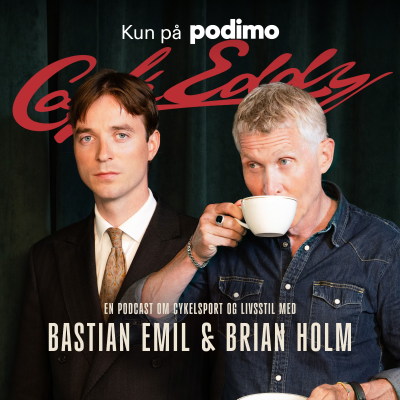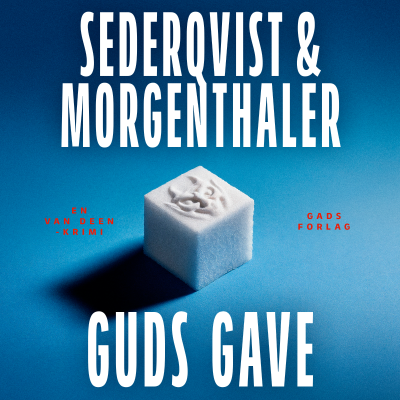
The Daily
4.3K
engelsk
Nyheder & politik
Begrænset tilbud
2 måneder kun 19 kr.
Derefter 99 kr. / månedOpsig når som helst.
- 20 lydbogstimer pr. måned
- Podcasts kun på Podimo
- Gratis podcasts
Læs mere The Daily
This is what the news should sound like. The biggest stories of our time, told by the best journalists in the world. Hosted by Michael Barbaro, Rachel Abrams and Natalie Kitroeff. Twenty minutes a day, six days a week, ready by 6 a.m. Subscribe today at nytimes.com/podcasts or on Apple Podcasts and Spotify. You can also subscribe via your favorite podcast app here https://www.nytimes.com/activate-access/audio?source=podcatcher.
Alle episoder
3409 episoderA New Media Empire
The bidding war between Paramount and Netflix over the acquisition of Warner Bros. Discovery appeared to come to a close last week, when Netflix backed out. The Times journalists Nicole Sperling, Lauren Hirsch and Jonathan Mahler discuss this Hollywood drama fit for the big screen, and why it could reshape our political and cultural landscape. Guest: * Nicole Sperling [https://www.nytimes.com/by/nicole-sperling], a New York Times reporter in Los Angeles, covering Hollywood and the streaming revolution. * Lauren Hirsch [https://www.nytimes.com/by/lauren-hirsch], a New York Times reporter who covers the biggest stories on Wall Street, including mergers and acquisitions. * Jonathan Mahler [https://www.nytimes.com/by/jonathan-mahler], a staff writer for The New York Times Magazine. Background reading: * Paramount raised its bid for Warner Bros. Discovery [https://www.nytimes.com/2026/02/24/business/paramount-netflix-warner-bros-discovery.html] last week. * Netflix lost Warner Bros., but maybe that’s a good thing [https://www.nytimes.com/2026/02/28/business/media/netflix-warner-bros-discovery-analysts.html]. Photo: Ricardo Nagaoka for The New York Times For more information on today’s episode, visit nytimes.com/thedaily [http://nytimes.com/thedaily?smid=pc-thedaily]. Transcripts of each episode will be made available by the next workday. Subscribe today at nytimes.com/podcasts [http://nytimes.com/podcasts] or on Apple Podcasts and Spotify. You can also subscribe via your favorite podcast app here https://www.nytimes.com/activate-access/audio?source=podcatcher [https://www.nytimes.com/activate-access/audio?source=podcatcher]. For more podcasts and narrated articles, download The New York Times app at nytimes.com/app. Hosted by Simplecast, an AdsWizz company. See pcm.adswizz.com [https://pcm.adswizz.com] for information about our collection and use of personal data for advertising.
The Midterms Begin With a Texas-Size Showdown
Democrats and Republicans will head to the polls in Texas today for an election that will send both parties a message about what voters want in Trump’s America. Shane Goldmacher, a national political correspondent for The New York Times, discusses the Senate primary that so many are watching. Guest: Shane Goldmacher [https://www.nytimes.com/by/shane-goldmacher], a national political correspondent for The New York Times. Background reading: * The Texas Senate primary [https://www.nytimes.com/2026/03/01/us/politics/texas-election-cornyn-paxton-crockett-talarico.html] offers a test case for each party. * The Republicans John Cornyn and Ken Paxton and the Democrats Jasmine Crockett and James Talarico are competing in bitter and expensive races [https://www.nytimes.com/2026/03/02/us/elections/texas-primary-senate-midterms-argument.html]. Photo: Haiyun Jiang/The New York Times; Aaron Schwartz, via Getty; Kenny Holston, via The New York Times; pool photo by Bob Daemmrich; Julio Cortez, via Associated Press For more information on today’s episode, visit nytimes.com/thedaily [http://nytimes.com/thedaily?smid=pc-thedaily]. Transcripts of each episode will be made available by the next workday. Subscribe today at nytimes.com/podcasts [http://nytimes.com/podcasts] or on Apple Podcasts and Spotify. You can also subscribe via your favorite podcast app here https://www.nytimes.com/activate-access/audio?source=podcatcher [https://www.nytimes.com/activate-access/audio?source=podcatcher]. For more podcasts and narrated articles, download The New York Times app at nytimes.com/app. Hosted by Simplecast, an AdsWizz company. See pcm.adswizz.com [https://pcm.adswizz.com] for information about our collection and use of personal data for advertising.
Celebration and Mourning: Inside an Iran at War
The United States and Israel continued to strike Iran with missiles for a second day on Sunday, destroying more power centers of the Iranian regime and, according to rights groups, bringing the civilian death toll over 100. Iran responded with retaliatory attacks. At the same time, all eyes were on the Iranian government and the millions of citizens who have long opposed it. Farnaz Fassihi, who covers Iran for The New York Times, brings us the view from a pivotal moment inside Iran. Guest: Farnaz Fassihi [https://www.nytimes.com/by/farnaz-fassihi], the United Nations bureau chief for The New York Times. She also covers Iran and how countries around the world deal with conflicts in the Middle East. Background reading: * Iranians took to the streets [https://www.nytimes.com/2026/02/28/world/middleeast/iran-khameni-celebrations.html] to celebrate the death of Ayatollah Ali Khamenei. * Here is the latest [https://www.nytimes.com/live/2026/03/01/world/iran-attack-khamenei-trump#top-iranian-security-official-says-interim-government-will-be-formed-sunday] on the war. Photo: Arash Khamooshi for The New York Times For more information on today’s episode, visit nytimes.com/thedaily [http://nytimes.com/thedaily?smid=pc-thedaily]. Transcripts of each episode will be made available by the next workday. Subscribe today at nytimes.com/podcasts [http://nytimes.com/podcasts] or on Apple Podcasts and Spotify. You can also subscribe via your favorite podcast app here https://www.nytimes.com/activate-access/audio?source=podcatcher [https://www.nytimes.com/activate-access/audio?source=podcatcher]. For more podcasts and narrated articles, download The New York Times app at nytimes.com/app. Hosted by Simplecast, an AdsWizz company. See pcm.adswizz.com [https://pcm.adswizz.com] for information about our collection and use of personal data for advertising.
The U.S. and Israel Strike Iran
The United States and Israel on Saturday launched an attack against Iran, killing the nation’s supreme leader, Ayatollah Ali Khamenei, and, according to Iranian state media, several people in the country’s leadership structure. The New York Times journalists Mark Mazzetti and David E. Sanger explain what is next for Iran, and what these strikes threaten to unleash. Guest: * Mark Mazzetti [https://www.nytimes.com/by/mark-mazzetti], an investigative reporter for The New York Times based in Washington, D.C. * David E. Sanger [https://www.nytimes.com/by/david-e-sanger], the White House and National Security Correspondent for The New York Times. Background reading: * Here’s what to know [https://www.nytimes.com/2026/02/28/world/middleeast/iran-attacks-what-to-know.html] about the U.S. attacks on Iran. * Fact-checking President Trump’s justifications [https://www.nytimes.com/2026/02/28/us/politics/trump-iran-attack-fact-check.html] for attacking Iran. Photo: Arash Khamooshi for The New York Times For more information on today’s episode, visit nytimes.com/thedaily [http://nytimes.com/thedaily?smid=pc-thedaily]. Transcripts of each episode will be made available by the next workday. Subscribe today at nytimes.com/podcasts [http://nytimes.com/podcasts] or on Apple Podcasts and Spotify. You can also subscribe via your favorite podcast app here https://www.nytimes.com/activate-access/audio?source=podcatcher [https://www.nytimes.com/activate-access/audio?source=podcatcher]. For more podcasts and narrated articles, download The New York Times app at nytimes.com/app. Hosted by Simplecast, an AdsWizz company. See pcm.adswizz.com [https://pcm.adswizz.com] for information about our collection and use of personal data for advertising.
'The Interview': Maggie Gyllenhaal on Envy, Rage and Reaching Out to Her Brother
With a big budget and a lot to say, the filmmaker is unleashing her inner monster with “The Bride!” * Thoughts? Email us at theinterview@nytimes.com * Watch our show on YouTube: youtube.com/@TheInterviewPodcast [https://www.youtube.com/@theinterviewpodcast] * For transcripts and more, visit: nytimes.com/theinterview [https://www.nytimes.com/column/the-interview] Subscribe today at nytimes.com/podcasts [http://nytimes.com/podcasts] or on Apple Podcasts and Spotify. You can also subscribe via your favorite podcast app here https://www.nytimes.com/activate-access/audio?source=podcatcher [https://www.nytimes.com/activate-access/audio?source=podcatcher]. For more podcasts and narrated articles, download The New York Times app at nytimes.com/app. Hosted by Simplecast, an AdsWizz company. See pcm.adswizz.com [https://pcm.adswizz.com] for information about our collection and use of personal data for advertising.
Vælg dit abonnement
Begrænset tilbud
Premium
20 timers lydbøger
Podcasts kun på Podimo
Gratis podcasts
Opsig når som helst
2 måneder kun 19 kr.
Derefter 99 kr. / måned
Premium Plus
100 timers lydbøger
Podcasts kun på Podimo
Gratis podcasts
Opsig når som helst
Prøv gratis i 7 dage
Derefter 129 kr. / måned
2 måneder kun 19 kr. Derefter 99 kr. / måned. Opsig når som helst.















































